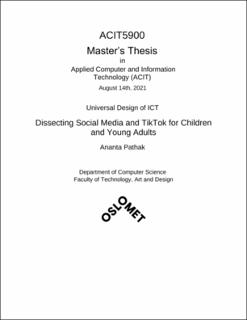| dc.description.abstract | The purpose of this thesis is to find out the effect of such AI algorithms used in social media like TikTok on the mental health/wellbeing of Norwegian children and young adults. To answer our research questions, we used a systematic literature review (SLR) approach. After analyzing all the 36 studies in a systematic literature review, We concluded with a hypothesis that AI algorithms might negatively affect the mental well-being and mental health of young and teenage users who are addicted to social media like TikTok in the form of anxiety, depression, lower self-esteem while, the reasons behind those problems are body image dissatisfaction, cyberbullying, fear of missing out, stranger danger, social isolation, social comparison, and being disconnected from social media. | en_US |
